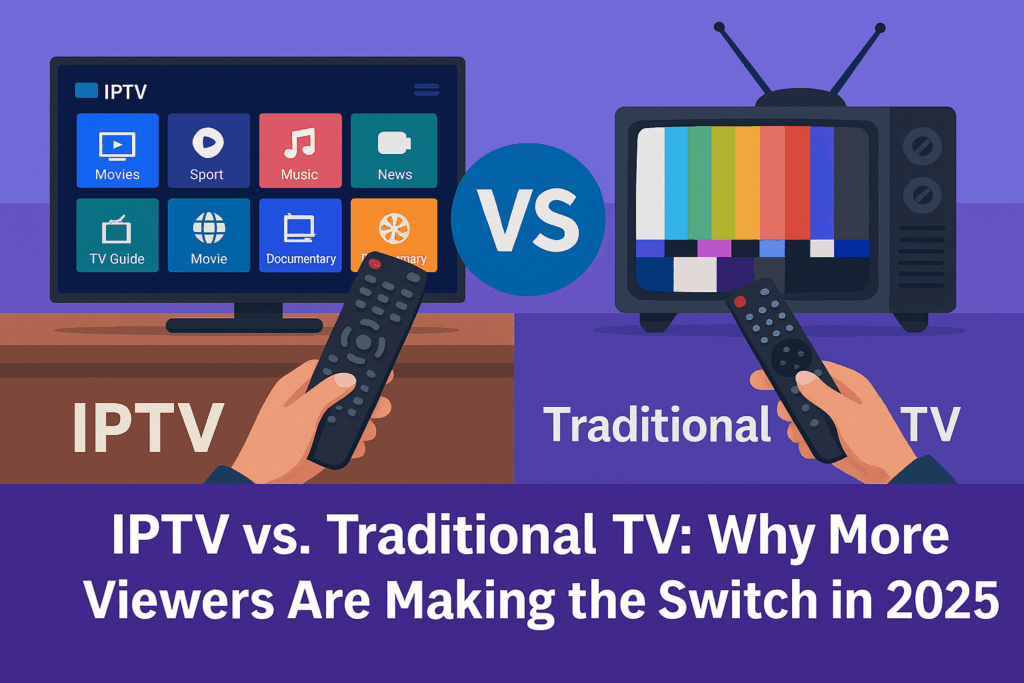
In recent years, the media consumption landscape has undergone a radical transformation. At the forefront of this shift is Internet Protocol Television (IPTV), which is rapidly replacing traditional cable and satellite TV. With the year 2025 marking another significant step toward the full digitalization of home entertainment, consumers are increasingly choosing IPTV for its flexibility, variety, and cost-effectiveness. But what makes IPTV the preferred choice, and how does it stack up against traditional television? Let’s dive deep.
What is IPTV?
IPTV stands for Internet Protocol Television — a system that delivers television content via the internet, instead of through traditional terrestrial, satellite, or cable formats. It enables users to stream content on-demand, live, or in the form of scheduled programming using internet-connected devices such as smart TVs, smartphones, laptops, and IPTV boxes.
The Downfall of Traditional TV
Traditional TV has been the go-to source of entertainment for decades, but its popularity is steadily declining. Several key limitations are pushing viewers to explore alternatives:
- Limited Flexibility: Fixed schedules force viewers to watch content at set times.
- Higher Costs: Monthly cable or satellite TV subscriptions often include channels users never watch.
- Geographical Boundaries: Traditional broadcasts are often restricted to specific countries or regions.
- Outdated Interfaces: Clunky remote-controlled navigation and lack of interactivity make the user experience outdated.
IPTV: The Future-Ready Alternative
IPTV not only solves these pain points but goes far beyond them with modern features and benefits that redefine television:
1. On-Demand Viewing
Watch what you want, when you want. IPTV platforms provide massive libraries of TV shows, movies, and sports that can be accessed at your convenience.
2. Personalized User Experience
With recommendation engines, user profiles, and intelligent content suggestions, IPTV platforms cater to individual preferences far more effectively.
3. Lower Cost
IPTV subscriptions are often significantly cheaper than traditional cable, especially considering the value of access to international content, premium channels, and multi-device support.
4. Global Access
Traveling abroad? No problem. IPTV lets you access your favorite content from anywhere with an internet connection, bypassing geo-restrictions in most cases.
5. Interactivity & Smart Features
Pause, rewind, or record live content. Integration with smart home systems, voice control, and mobile apps make IPTV much smarter than legacy television.
IPTV in 2025: Key Growth Drivers
Several developments in 2025 are accelerating the shift toward IPTV:
- 5G Internet: Ultra-fast connectivity ensures smooth streaming even in rural areas.
- Smart Devices Boom: As smart TVs and mobile devices become more common, IPTV fits naturally into the lifestyle.
- AI Integration: Content curation and viewer analytics powered by AI offer better, more tailored experiences.
- Sustainability Trends: IPTV is considered greener than cable TV, as it reduces hardware waste and energy consumption.
Comparing IPTV & Traditional TV – At a Glance
| Feature | Traditional TV | IPTV |
|---|---|---|
| Schedule Flexibility | No | Yes |
| On-Demand Content | Limited (VOD) | Extensive |
| Monthly Cost | High | Competitive/Low |
| Device Compatibility | Limited (TV only) | Multi-device |
| User Personalization | Minimal | Advanced AI-driven |
| Global Accessibility | No | Yes |
Is IPTV Right for Everyone?
While IPTV has many advantages, it’s not without caveats. A strong, stable internet connection is essential for uninterrupted viewing. Users also need to be cautious of illegal IPTV providers offering pirated content, which could lead to legal or security issues.
The safest route? Choose reputable IPTV services with legitimate licensing agreements, user support, and secure infrastructure.
Conclusion
In 2025, the gap between IPTV and traditional TV has become a chasm. IPTV offers a compelling blend of affordability, freedom, and cutting-edge technology that continues to attract viewers across the globe. As the future unfolds, IPTV isn’t just a replacement for traditional TV — it’s a leap forward into a more intelligent, accessible, and enjoyable entertainment experience.
